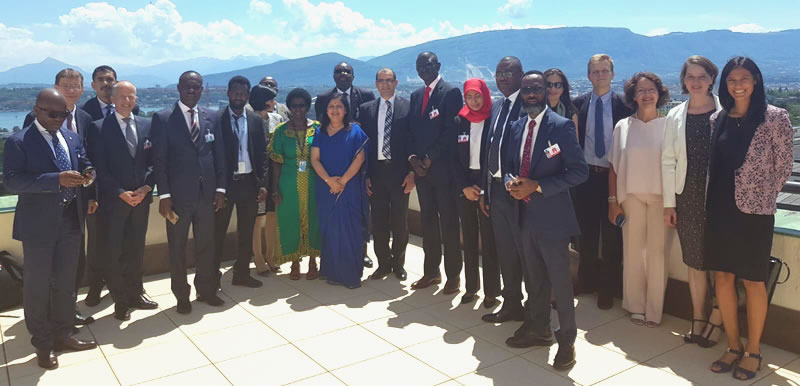Accessing credit is a persistent problem for businesses everywhere, all the more so in developing economies. Financial institutions are helping them take their place in world trade.
Bridging a global trade finance gap estimated at $1.5 trillion by the Asian Development Bank (ADB) requires cooperation between a host of different players.
Under the auspices of UNCTAD, the Global Network of Export-Import Banks and Development Finance Institutions (G-NEXID) was formed in 2006 to facilitate cooperation amongst policy banks and similar institutions in support of South-South trade, investment and project finance. With membership drawn from across Africa, Asia, Eastern Europe and Latin America, G-NEXID is headquartered in Geneva, Switzerland.

“The ability of businesses in developing countries to trade internationally can be seriously hampered by a lack of investment and finance, including export credit and insurance. The G-NEXID partners work together to push for policies and cooperation that help businesses overcome these hurdles,” said UNCTAD expert Frida Youssef, one of the founders of G-NEXID and a member of its steering committee.
G-NEXID members gathered at the United Nations Office at Geneva this 4 July to discuss the role of collaborative action in addressing the trade finance gap.

The meeting was jointly opened by the network’s Honorary President, Mr. Abubakar Abba Bello, Managing Director, Nigerian Export-Import (NEXIM) Bank, and Mr. Richard Kozul-Wright, Director of the Division on Globalization and Development Strategies, UNCTAD.
Dr. Marc Auboin, Counsellor at the Economic Research and Statistics Division of the World Trade Organization (WTO), highlighted the challenges faced by developing countries, with a focus on the post-2008 financial crisis regulations and their impact on banks’ de-risking that contributed to the decline of correspondent banking relationships – where one bank provides services on behalf of another, thereby making it easier for companies to trade across borders.
He offered an overview of key policy responses discussed in the framework of the WTO Expert Group on Trade Finance. These include enhancing the trade facilitation programmes of multilateral development banks, reducing the knowledge gap in local banks, maintaining and open dialogue regarding regulations, and monitoring of trade finance provisions.
This global perspective was followed by a presentation from Mr. Vinco David, Secretary-General of Berne Union – the leading global association for the export credit and investment insurance industry –o n how credit insurance is used to attract trade finance as a contribution to addressing this gap. The event also spotlighted the trade finance programmes of the ADB and the European Bank for Reconstruction and Development (EBRD).
Building capacity
Subsequently, a roundtable dialogue, moderated by Ms. Elizabeth Gachuiri, Economic Affairs Officer at UNCTAD, was held between Dr. Anthony Coleman, Senior Economist at the African Export-Import Bank (Afreximbank), and key G-NEXID members on specific capacity-building programmes as a tool to address the trade finance gap.
The workshop concluded with a presentation from Ms. Sangeeta Sharma, Chief General Manager, Export-Import Bank of India, on the trade finance gap, trends and the consideration of a proposal of a Letter of Credit Confirmation Facility amongst G-NEXID members.
Letters of credit are a key component of trade, with confirmed letters offering a second level of guarantee, involving more than one bank. Typically, confirmed letters are used when the issuing bank of the first letter of credit may have questionable creditworthiness and the seller seeks to obtain an extra layer of guarantee from a buyer to reduce the risk of payment default.
The G-NEXID institutions will seek to endorse the use of reciprocal a confirmation facility wherever feasible when a trade opportunity arises between the two countries. As such facilities entail bilateral arrangements, the facility will be completed bilaterally under the umbrella of G-NEXID.
The workshop also included keynote speech by Anton Said, Chief of Export Strategy at the International Trade Centre (ITC), a key partner of the G-NEXID, on small and medium enterprises and collaborative responses to the trade finance gap.
Moreover, members of the network had an interactive session with members of the Swiss Trading and Shipping Association (STSA).



